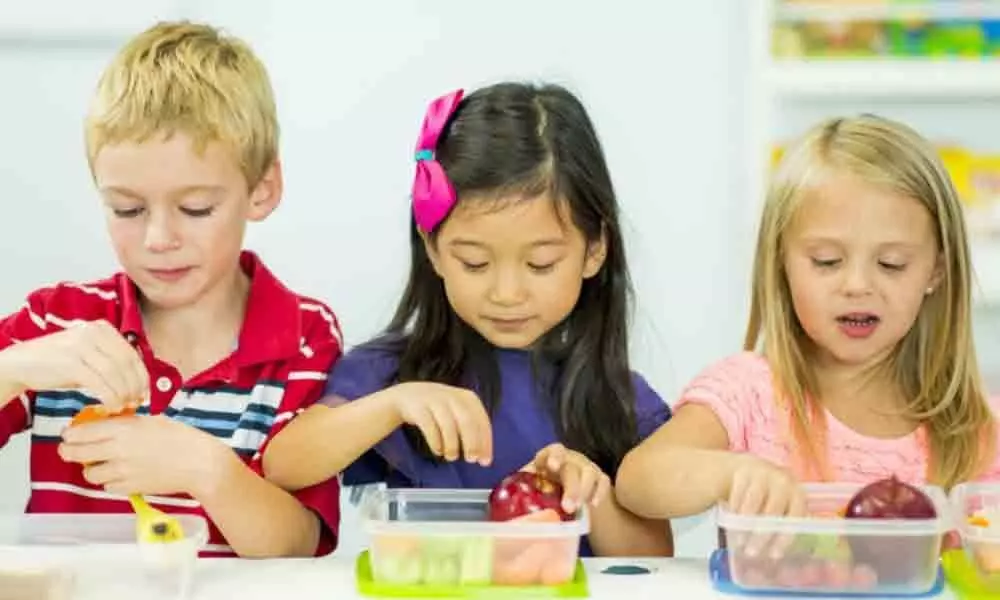Eating tips for school children

School-age is the perfect time for children to learn about healthy food, bodies and activity. This is the time they start a busy social life, have pocket money and begin to help choose their own lifestyle. Children of this age learn quickly and are also influenced by their friends and popular trends.
School-age is the perfect time for children to learn about healthy food, bodies and activity. This is the time they start a busy social life, have pocket money and begin to help choose their own lifestyle. Children of this age learn quickly and are also influenced by their friends and popular trends.
Children need a wide variety of foods for a well-balanced diet. The amount of physical activity they have in a day will be an important part of how much they need to eat. When children are busy and active, snacking is important to keep energy levels high. A healthy morning snack at recess and one after school are usually needed each day.
Breakfast is important
It is important to encourage breakfast. A good night's sleep followed by food in the morning helps your child to stay active and concentrate at school. It also means your child is less likely to be too hungry during the morning and it can help with performance at school. Be a role model and let your child see you eat breakfast too. A bowl of cereal with milk and fresh or stewed fruit is a great starter for the whole family.
School lunches
Many schools have a canteen that offers a range of food choices. Most schools follow government guidelines to encourage healthy food choices. The food your child chooses might be high in cost and energy, but low in nutrients sometimes. An alternative is a packed lunch from home, which is a great way for your child to learn about healthy food and to help with preparation.
Lunch box suggestions include:
Sandwiches or pita bread with cheese, lean meat, hummus and salad
Cheese slices, crackers with spread, and fresh or dried fruits
Washed and cut up raw vegetables or fresh fruits
Frozen water bottle or tetra pack of milk, particularly in hot weather.
School lunches – foods to limit
Highly processed, sugary, fatty and salty foods should only make up a very small part of your child's diet. Foods to limit in everyday school lunches include:
• Processed meats such as salami, ham, pressed chicken and Strasbourg
• Chips, sweet biscuits, and muesli bars and breakfast bars
• Fruit bars and fruit straps
• Cordials, juices and soft drinks.
Treats and peer pressure
Peer pressure to eat particular 'trendy' foods at this age is strong. Let your child eat these kinds of foods occasionally, such as at parties, special events or when the rest of the family enjoys them. It's best to limit the amount of money children are given to spend at school or on the way home.
The occasional lolly, bag of chips or takeaway food doesn't do any harm. If they are eaten too often, however, you might find that:
• Not enough nourishing foods are eaten.
• Children become overweight or obese.
• You're spending a lot of money – it's much cheaper to provide homemade snacks and lunches.
• You're missing a chance to teach your child about healthy eating.
After-school snacks
Children of this age may have swings in appetite depending on activity levels, so allow them to choose how much they need to eat while offering a wide variety of healthy foods. Some children only eat small amounts at the evening meal, so make sure that the afternoon snack is nutritious, not just high in energy.
Snack suggestions include:
• A sandwich with a glass of milk
• Cereal and fruit
• A bowl of soup and toast.
Family mealtimes
For schoolchildren, family mealtimes are a chance to share and talk about the day's activities and events. The evening meal together is an important time to do this.
Family mealtime suggestions include:
• Allow talk and sharing of daytime activities.
• Avoid distractions such as the television, radio or the telephone.
• Let your child decide when they are full – don't argue about food.
• Allow children to help with preparing meals and shopping.
• Teach some simple nutrition facts such as 'milk keeps your bones strong'.
Drinks
Suggestions include:
• Children should be encouraged to drink plain water.
• Sweet drinks such as cordials or fruit juice are not needed for a healthy diet and aren't recommended.
• A glass of milk (or a tub of yogurt or slice of cheese) equals a serve of dairy food. Three serves are needed each day for calcium.
Exercise and activity
Physical activity is an important part of good health. Try to encourage your child to do something active each day, such as a hobby, play a game or be involved in sport. Some parents may also worry about their child's weight.
For primary school children 60 minutes of activity is recommended each day, and no more than two hours of watching TV, DVDs or computer games.
To increase your child's activity, try to:
• Limit the amount of time spent watching television for the whole family.
• Do something physical and active together.
• Go and watch your child play sports.
• Encourage daily activity, not just exercise.
• Use the car less – that means everyone!














